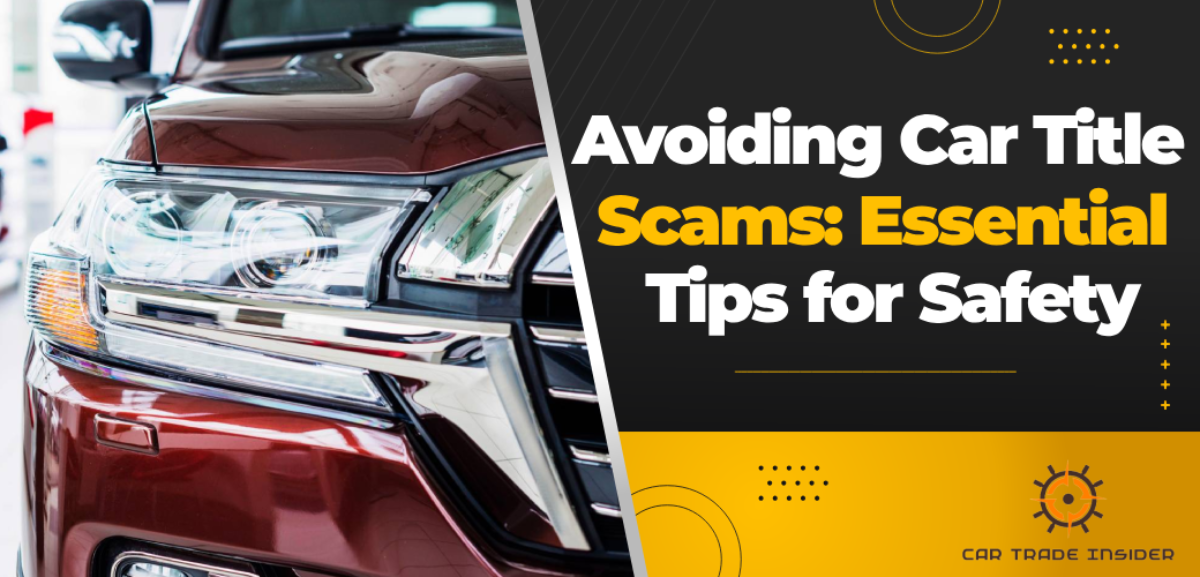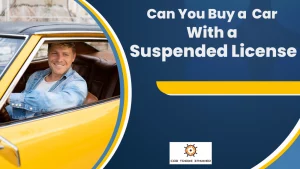Buying a used car might seem easy, but it gets tricky with car title scams. These scams can have serious consequences, leaving you with a vehicle that isn’t legally yours or, even worse, losing your hard-earned money.
Each day, countless individuals unknowingly become victims of this automotive subterfuge, and the scammers persist in their endeavors because many remain unaware of their cunning tactics.
The unsettling truth is that these scams are more common than you might imagine.
Recent cases of car title scams
- Chicago Odometer and Title Fraud Scheme: Three Chicago men were charged with altering odometers and titles, causing financial losses for buyers.
- Las Vegas Title Fraud Case: Three Las Vegas men face charges for an illegal lien sale scam, attempting to gain ownership of vehicles valued at over $328,000 through fraudulent work orders.
So, how can you shield yourself from the clutches of a fraudulent title? To help keep you safe in your car hunt, our experts, who know a lot about consumer titles, have uncovered the top car title scams, and provide a roadmap to identify and evade such scams.
What Is a Car Title?
Issued by the state, this document is indisputable proof of your ownership, detailing your car’s make, model, year, and unique Vehicle Identification Number (VIN). It’s a comprehensive record, encompassing the car’s history, past owners, and current condition.
From previous owners’ names and purchase dates to odometer readings and liens, the title is a roadmap through your car’s life. Whether it’s a clear, clean, rebuilt, or salvage title, understanding these classifications ensures a transparent buying or selling experience.
So, next time you glance at your car title, recognize it as more than just bureaucracy—it’s your car’s story etched on legal parchment.
What Are Car Title Scams?
In a nutshell, car title scams involve fraudulent activities related to the vehicle’s title, such as forged titles, title washing, or hidden liens. These scams can be incredibly convincing, often leaving buyers completely unaware that they’re walking into a trap.
To avoid becoming a victim, it’s crucial to stay informed about the red flags to look out for and the necessary steps to take when purchasing a used car. So, if you’re eager to learn how to navigate the used car market safely and protect yourself from car title scams, keep reading.
Consequences of Vehicle Title Fraud
- Overpayment for Damaged Vehicle: Purchasing a “clean” car at an inflated price, paying more than the vehicle’s actual value.
- End Up with a Broken Vehicle: Fraudulent titles lead to serious repair bills, risking driving a dangerous vehicle.
- Buying a Stolen Vehicle: Risk of impoundment and legal trouble if the police discover the vehicle is stolen.
- Buying from an Identity Thief: Beyond title fraud, identity theft risks exist, with scammers possibly using collected information for identity theft.
Common Types of Car Title Scams
1. Creating a Fake Title
Some commit title fraud by creating fake titles, either physically cutting up existing titles or using online templates. Scammers charge large sums, claiming to obtain a new title without providing legal documents. Victims end up with an illegal title and potential legal consequences.
2. Hiding Liens on the Title
One of the most prevalent car title scams involves hiding existing liens on the vehicle. Scammers may do this by altering the title or presenting an outdated one, tricking the buyer into thinking the car is free of any debts.
3. Title Washing
Title washing is a deceptive practice where a salvaged vehicle’s title is fraudulently “cleaned” to remove any indication of it being previously totaled or severely damaged. This scam aims to make the car appear to be in better condition than it actually is.
4. Duplicate Titles
In this scam, a fraudster obtains a duplicate title and sells the car to multiple buyers, leaving the legitimate buyer with a worthless piece of paper.
5. Odometer Rollback
Odometer rollbacks deceive buyers by manually changing mileage readings, making vehicles seem newer and better-conditioned than they are. This practice is not only unethical but also illegal.
6. VIN Cloning
In VIN cloning, the scammer takes the Vehicle Identification Number (VIN) from a legitimate vehicle and attaches it to a stolen one. This makes the stolen car appear legal, and the unsuspecting buyer becomes the unknowing owner of the stolen property. Protect yourself with the National Crime Bureau’s free VINCheck® service.
7. Title jumping
Commonly associated with unlicensed car dealers, title jumping occurs when the current owner fails to register the vehicle in their name before selling it to a new buyer. Buyers caught in this scheme may face undisclosed issues with the vehicle, potentially affecting its resale value. Additionally, title jumping can involve out-of-state transactions with salvaged vehicles, further complicating the buyer’s experience.
Common Signs of a Car Title Scam
To protect yourself from car title scams, it’s essential to recognize the warning signs that indicate a potential scam:
1. The Seller Presents a Suspect Title
In the intricate dance of title scams, appearances can be deceiving. Watch for giveaways such as peeling edges, missing watermarks, fuzzy printing, or grammatical errors. When in doubt, seek verification from your state or consult with a seasoned attorney.
2. Out-of-State Titles
While a title from another state doesn’t automatically signal trouble, caution is advised—especially if it’s from a considerable distance. Be alert if the previous owner acquired a new title shortly before selling. Stay vigilant; if something feels off, consider stepping away.
3. Reluctance to Reveal the Title Pre-Sale
Beware of sellers employing delay tactics. If a seller hesitates to show you the title before the sale, trust your instincts. Transparent sellers should readily provide this essential document for your scrutiny.
4. Suspiciously Low Prices
If the deal seems too good to be true, it probably is. Scammers often lure victims with unbelievably low prices to entice them into quick transactions.
5. Pressure Tactics
Be cautious of sellers who put pressure on you to make a fast decision. Scammers use this tactic to prevent buyers from conducting proper research and due diligence.
6. Absence of Vehicle History Report
A genuine seller will readily provide a vehicle history report. If the seller is reluctant or refuses to provide one, it might be an indication of something suspicious.
7. Mismatched Car Parts
A detailed inspection of a vehicle’s parts can unveil much. Rusted or mismatched components may indicate an effort to disguise a rebuilt vehicle or conceal defects. Scrutinize the car thoroughly, or seek a second opinion if anything seems awry.
8. Hasty VIN Checks: A Scammer’s Strategy
Scammers often rush the process, hindering your ability to conduct a thorough VIN check. Leverage resources like vehiclehistory.gov to access vital information about the car’s history. If the seller is hesitant about the VIN or allows inadequate time for research, exercise caution against potential fraud.
How to Protect Yourself from Car Title Scams
To safeguard yourself from falling victim to car title scams, follow these preventive measures:
1. Obtain a Vehicle History Report
Before purchasing a used car, always obtain a vehicle history report from a reputable service. This report will reveal important information about the car, including its previous accidents, repairs, and ownership history.
2. Caution on Recently Issued Titles
A red flag arises if the title was recently issued. Question the seller about the circumstances. If a recent title is associated with an older vehicle or is registered non-locally, exercise caution.
3. Examining Print Quality and Watermarks
A poorly printed title could indicate tampering, especially concerning newer vehicles. Check for watermarks, as they are a security feature on salvage titles. Familiarize yourself with genuine titles before meeting the seller to confidently identify irregularities.
4. Verification through VIN and CARFAX
Utilize resources like CARFAX Vehicle History Reports and VIN checks. Cross-verify the registered vehicle information with the details on the title. Any discrepancies should raise concerns. Obtaining a CARFAX Report and performing a VIN check ensures transparency in the car’s history.
5. Use Escrow Services for Online Transactions
When buying a car online, opt for using escrow services. This will hold the payment securely until you receive the vehicle and verify its condition.
6. Be Cautious of Cash-Only Transactions
Avoid cash-only transactions, as they leave no paper trail. Use payment methods that provide a record of the transaction, such as cashier’s checks or electronic transfers.
7. Complete the Transaction at the DMV
Conduct the transaction at the Department of Motor Vehicles (DMV) to ensure the process is legitimate and the paperwork is handled correctly.
8. Validate Out-of-State Registrations
When considering a used car, inquire about its registration history. If it’s registered in another state, ask the seller for clarification. Understanding the reasons behind the out-of-state registration can reveal potential issues, such as salvage title designations.
9. Look for Mismatched Information on the Title
Utilize resources like CARFAX Vehicle History Reports and VIN checks. Cross-verify the registered vehicle information with the details on the title. Any discrepancies should raise concerns. Obtaining a CARFAX Report and performing a VIN check ensures transparency in the car’s history.
What to Do If You Suspect a Scam
If you suspect that you are dealing with a car title scam, take the following actions:
Contact the Authorities
Report the incident to your local law enforcement agency or National Insurance Crime Bureau. providing them with all relevant information about the scammer and the transaction.
Consult with a Legal Professional
Seek advice from an attorney experienced in consumer protection and automotive law to understand your rights and potential courses of action.
Report the Scammer Online
Notify the online platform where the transaction took place about the scammer’s activities. This can help prevent others from falling victim to the same scam.
FAQs
1. Is it legal to sell a car without a title?
No, it is not legal to sell a car without a title. The title serves as proof of ownership, and selling the car without a title is considered illegal and can lead to legal consequences for the seller. You can further read this in detail in our topic about “Will a dealership take a trade-in without the title?
2. What is a salvaged title, and should I avoid buying a car with one?
A salvaged title is issued when a vehicle has been heavily damaged, and the cost of repairs exceeds its market value. While some salvaged cars can be repaired and safely driven, they often come with potential issues and reduced resale value. It is essential to thoroughly inspect the car, obtain a professional mechanic’s opinion, and consider the potential risks before purchasing a vehicle with a salvaged title.
3. Can I perform a title transfer online?
Title transfer processes vary by location, and some states or countries may offer online options. However, it’s crucial to ensure that you are using an official and secure government website for any online transactions. Be cautious of third-party websites that claim to offer title transfer services and always verify the legitimacy of the platform.
4. Are there any government resources to check for stolen cars?
Yes, You can visit your country’s official law enforcement, vehicle registration website or by using NICB’s Free VINCheck® Service to perform a stolen vehicle check using the car’s VIN.




